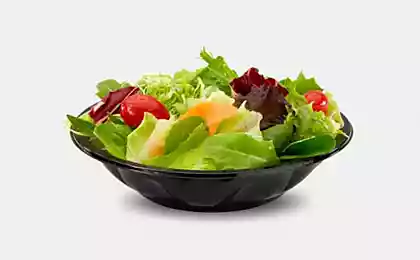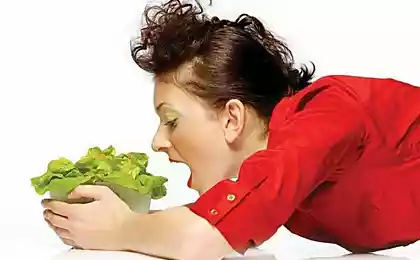671
Ortoreksiya: obsessive neurosis "proper nutrition»
Rule of thumb is that any effective means is bound to have side effects. So a healthy diet has its own complications caused by mental instability and a low level of food education. These complications are called orthorexia.
The name "ortoreksiya" comes from 2 words: "orthos" meaning "straight, right", and "orexia" — appetite. This is an eating disorder characterized by an obsessive desire for "healthy and proper nutrition", which leads to considerable restrictions in the choice of food. In this article we take a look at what the differences between a healthy and proper nutrition, as well as how to avoid the trap ortoreksii.
Ninety four million three hundred sixty three thousand nine hundred forty eight
Where did ortoreksiya?
Daughter of Jessica Alba sits on an organic diet containing no sugar. Uma Thurman and Donna Karan is committed to "raw food diet" and eat only raw vegetables, fruits, nuts and seeds. Oprah Winfrey has completed the course of "detoxification" cleansing program that is passed the three week diet which excluded sugar, alcohol, caffeine, gluten and animal products. Although the examples are countless, and the list exclude from the diet products, the infinite, the logic of all these strict diets alone – ostensibly to improve health.
Currently, millions of people suffer from obsessions on healthy eating and exercise. All these people lead a healthy way of life is not to live happily ever after. It's quite the opposite. They live only in order to comply with the diet and visit the gym. Ortoreksiya – the disease is quite serious, often resulting in very serious consequences, both physical and mental health.
In Greek ortoreksiya means "proper food", "the right appetite". At the moment, there are no strict diagnostic criteria and the diagnosis orthorexia orthorexia not included in the classifications DSM-IV and ICD-10, so this diagnosis cannot be made officially, but experts widely use the term "ortoreksiya" to describe this eating disorder.
This term was made in the nineties in the book of American Steven Bratman "Addiction to useful products: how to overcome the obsession with proper nutrition".Through orthorexia the author of a book myself. In the distant seventies, along with his associates Stephen Bratman organized a municipality wishing to have only organic products. The basis of the diet of this community was grown with their own hands the vegetables and fruits. Meat and fish are not lucky, they are excluded from the menu. Bremen thought to chew every bite of food at least 50 times. Over time, the "useful eaters" moved to an even more restricted mode. As a result, the Stephen brought himself to physical and nervous exhaustion.
To the great joy, Steven had met on the way professional sage and ascetic, part – time- monk. It helped him cope with the psychological dependence. Steven finally realized the difference between power extremely correct and really healthy. It became evident that a healthy lifestyle and fanaticism are incompatible.
Spanish Explorer Catalina Zamora and her colleagues define orthorexia as "a pathological obsession with organic food, leading to dietary restrictions." Patients orthorexia exclude from your diet huge amount of food, considering them "impure", because these products, in their opinion, contain herbicides, pesticides or artificial additives (e.g., dyes, flavors, MSG and other ingredients used in the food industry). Excessive concern and frustration about the digestive process is also a hallmark of people suffering from orthorexia. Because of their obsessions and fears of ortoreksiki become lonely, dissatisfied with their lives and to reduce all social contacts to a minimum, which in turn only exacerbates their situation, reinforces the obsessive concern about food. Each of us is a potential orthorexia. What at first is seen as a normal disease prevention, strengthen the immune system, treatment of diseases or banal slimming, in the end, forcing people to become slaves to their food beliefs and eating any "forbidden" product causes panic and endless guilt. In the end, such a diet with many restrictions, rituals and meager set of "clean" foods leads to excessive weight loss, exhaustion, imbalance and, in extreme cases, even death.
Marketing and sales.In the Wake of the boom, "proper nutrition" is a lot of money. Remember the rule: if the product says that it is for healthy food, as a rule, it is not worth buying. You need to understand that the task of the marketing machine is selling mainly consumer products. And not always these products are right for you. People are so obsessed with gaining a perfect body and strongest health, which tend to absorb all marked “helpful”.
Compare ortoreksii (nutrition) and a healthy diet.
Ortoreksiya
Healthy diet
Choice of products
Just right "most healthy" products.
Selection criteria: taste and interest. Chooses what "I want" that "saturate", that "satisfy."
Range of products
Very narrow, up to one "trusted" vendor
A wide range of products, not afraid to try new things and the unknown
Compare products
According to the criterion of "usefulness" is very polar. Bran is supposedly a panacea, and store-bought bread is poison!
A comparison of "want - not", "tasty-tasteless", "suitable – not suitable»,
Attitude towards people who eat differently
A sense of superiority over others, the constant lecturing others on accusations of "wrong" food
"As you wish, and eat." If a party to honor hosts important to try and compliment.
If you are able to stick to your diet
A sense of superiority, complete control over life, the growth of self-esteem.
Don't even notice it.
If you are unable to stick to my diet.
Fear, terror, guilt.
Will think tired and need to take care of themselves.
The consumption of time and money on food
A big waste, this constant thinking about food. Thinking about food more than three hours a day.
Buys the products ensures that the freezer was in the extreme case, can estimate the diet per day, no more.
Convenience food
Takes a lot of time
Save time
Planning of the diet
Calorie counting, calculation of proteins, fats and carbohydrates, weekly or monthly menu. On a tight schedule with painted grams.
Focus on what is available, what to make of this tasty, appropriate and nutritious. Planning a meal based on its activity and appetite (hunger)
Social environment
Selects the "right consumers", limits the communication with the "wrong" avoids the "wrong" restaurants and friends.
Food does not affect the choice of friends, aims to combine food and fellowship, often eats in the company
The purpose of changing the power
To take your life under control and feel better.
To get in shape, be more energetic to achieve some basic goals.
What draws the attention
On external authorities, books, gurus, healers.
The inner feeling of comfort, convenience, and objective results.
Psychopathology ortoreksii.
Of course, not all the people attending a gym and not obyedine at night, suffer from orthorexia. It all depends on the degree of importance that people attribute to diet and training. Some researchers believe that ortoreksiya is a form of obsessive-compulsive disorder or hypochondria.
Some authors believe that ortoreksiya is not a psychological disorder, but only a social trend, which, however, in some cases, you may have a negative impact on health or lead to serious eating disorders such as anorexia nervosa. The methodology is a questionnaire aimed at identifying neural ortoreksii — prolonged (not transitory) mental disorder, which the authors define as "a maniacal obsession with healthy food."
At the present time it is actively exploring the following theories: ortoreksiya as an independent disease, ortoreksiya as an option/stage of development, another well-known eating disorders (particularly anorexia or bulimia), ortoreksiya as a manifestation of personality disorders and ortoreksiya as a manifestation of the syndrome of obsessive actions (obsessive-compulsive).
An important aspect orthorexia is hard to control. Orthorexic, taking an area under control, feeling relieved. This is logical, as the sense of control helps reduce stress. But this condition can progress.
Stephen Bratman suggests that one of the reasons ortoreksii is the pursuit of superiority in relation to other people. According to Bratman, the individual feeding on a particular system, had to exert considerable willpower in order not to violate the rules. He has to give up favorite foods, and he devotes a significant amount of time reading literature on health, "proper" cooking, etc. All this evokes a sense of pride, a sense of its uniqueness and condescending attitude towards those who are incapable of such restraint and self-discipline. According to Bratman, in the end, the idea of proper nutrition turns into a kind of "kitchen religion", she becomes the center of interests of the individual, creates the illusion of "purity" and "spirituality", and also allows you to maintain your high self-esteem.
A day filled with bean sprouts, dried Japanese plums and dry biscuits from amaranth causes the same feeling of sanctity, as a day dedicated to helping the poor and homeless.
Some authors believe that ortoreksiya is a kind of anorexia. It is noted that persons suffering from anorexia nervosa, and those who have a tendency to orthorexia have similar traits: perfectionism, high level of anxiety and need for control over their lives. However, the distinction between orthorexia and anorexia is that with anorexia, the individual is concerned primarily with the amount of food and its caloric content, and at ortoreksii — quality (i.e. composition and method of preparation). In addition, persons with orthorexia, not always committed to losing weight (unlike those who suffer from anorexia). Although in some cases weight loss has some importance for them, after all, the primary objective for ortoreksii is improving and maintaining physical health as well as feelings of bodily "purity".
Some authors believe that ortoreksiya is not an eating disorder (like anorexia and bulimia), and a form of OCD. However, it should be noted that in contrast to individuals exposed to ortoreksii, the individual suffering from compulsive aware of the irrationality and futility of their behavior, while those who show signs ortoreksii convinced that their diet improves their health. The characteristics ortoreksii is isolation and intolerance towards other people's views on food and health.
Symptoms ortoreksii.
1. Only the "right" food.
The individual suffering from orthorexia, select food on the basis of their personal taste preferences. The only selection criteria is how this product is considered "healthy" or "correct". Persons with orthorexia, usually do not eat salty, sweet, fatty, and foods containing starch, gluten (gluten) alcohol, yeast, caffeine, chemical preservatives, non-biological or genetically modified foods. Among persons suffering from orthorexia, popular for various diets and the raw food diet. Sometimes excludes starchy foods, meat or dairy products.
Nutritionists from the Mayo Clinic (USA) made an attempt to describe the behavior of a typical patient with orthorexia: it avoids food that contains artificial colors, flavorings and preservatives, pesticides, genetically modified foods, unhealthy fats, high doses of sugar and salt; he repeatedly and thoroughly washes the products, preparing for a long time, not touching your hands to the raw products; he eats only at home and only that he bought and prepared, which becomes unsociable and antisocial.
2. Fanaticism.
For ortoreksii also characterized by dichotomous classification of food, without any nuances. The product is considered to be either "useful" (so it should be consumed in large quantities), or "bad" (it can not be used under any circumstances). In some cases, fear of the "harmful" products comes to the extent of phobia. In this case the individual is suffering from orthorexia, afraid to eat "dangerous" food even if it is hungry.
3. Fear of deviation from “proper food”.
If the individual still failed to refrain from eating "bad" product, he feels strong anxiety and, in some cases, guilt, accompanied by low self-esteem, forcing him to appoint himself the "punishment", such as increased dietary restriction, starvation or a large number of physical exercises).
4. Constant worry about food.
Some other doctors believe that an excessive concern about healthy eating is only a symptom of an already existing eating disorder, but it is not an eating disorder in itself. However, the fact is clear: ortoreksiki, some of which are young children, experiencing strong anxiety relating to the permitted, in their opinion, to eat food. And regardless of medical status ortoreksii, Dr. Bratman strongly characterizes it as an eating disorder than to once again attract public attention to food addictions in General.
Eating disorder or food addiction, involves a different spectrum of abnormal eating habits – permanent diet, the exclusion of food "bad" food, lack of desire to eat in the presence of certain people lie about food or feeling guilty after eating. Some habits, such as constant calorie counting, avoidance of packaged foods or meat may be perceived as healthy eating habits, not to recognize the symptoms, thereby depriving the patient of appropriate treatment. In addition, patients with orthorexia carefully study all of the purchased products to determine the presence of preservatives and other "chemistry" and resign from them. The case often comes down to the fact that people refuse from taking medicines, even in cases of severe disease.
5. Other symptoms orthorexia are:
— daily hours (usually at least three hours) thinking about the necessity of maintaining a healthy lifestyle;
— constant fear of illness and fear of weight-gain;
— careful planning tomorrow's menu and the inability to eat what's just there in the fridge;
— a complete rejection of your favorite "bad" food in favor of the unloved, but "useful";
— inability to eat outside of the house, as it is not homemade food may not meet the requirements of "health";
— a complete rejection of the use of fats and carbohydrates, sometimes salt;
— continuous study of the physiology of nutrition;
— striving every day to dump in the gym more and more calories;
— daily count of calories eaten and suggestion to himself that once ate one cake, now engaged in the gym will have two times more.
Orthorexic is concerned about the repeated menu planning for the next day;
thinking about healthy eating more than three hours a day; the quality of life has deteriorated as improving Your diet. Orthorexic usually starts stricter to myself.
Very alarming symptom is if Your self-esteem improves that You eat healthy food and you look down on the poor that you poison yourself with unhealthy foods. If you feel guilt and engaged in self-flagellation in the event of a deviation from your diet and a feeling that everything is under control when you eat correctly.
Unscientific "useful power".
Though supporters ortoreksii supposedly committed to health, in practice they apply the radical and fanatical methods and diet. Their beliefs, though often look reasonable, the test is full of contradictions. Bratman also drew attention to the fact that books promoting a healthy diet, full of contradictions:
Spicy food is harmful, but Cayenne pepper is good for health. Diet for weight loss, which all but eliminates oranges is helpful, but citrus fruits contain too much acid. Milk is good only if it is obtained from young cows (but pasteurized milk is harmful), but boiled milk is the food of the gods. Fermented foods such as sauerkraut is rot; at the same time, fermented foods aid digestion. Sweets is harmful, but honey is the most perfect of natural products. Fruit is a perfect food; fruits cause fungal diseases. Vinegar is a poison, but Apple cider vinegar cures almost all diseases. Proteins should not be used in food mix with products containing starch, but the beans should always be cooked together with rice.
From the usual adherence to the rules of healthy nutrition, ortoreksiya is the complete absence of "brakes" which can be recognized by certain extremes. For example, a person elevates the cult of the use of only trubnykh loaves, declaring store-bought bread "poison". While orthorexic fully convinced of the correctness and even feels substantially more developed than others – those who eat "junk" and "junk". He can not think that something is wrong. Such as obsessions, together with the conviction that they are right, coupled with the undoubted eating disorders have in common orthorexia with anorexia.
But the consequences of a raw food diet, which is frankly harmful diet:
In some severe cases, the strict exclusion from the diet of any group of products can lead to depletion. For example, in Germany from 1996 to 1998, the second year under the leadership of Klaus Leitzmann (Claus Leitzmann) Gizinski University (Justus-Liebig-Universität Giessen) conducted a major study of raw foodists. In the course it was revealed that a third of surveyed women under the age of 45 years was suffering from amenorrhea, 45% of all surveyed men and 15% women were found on iron-deficiency anemia, what the more, the more was the experience of a raw food diet. In the blood of all surveyed identified a lack of calcium, iron, magnesium, iodine, zinc, vitamins E, D and B12, and the amounts of magnesium, iron and vitamin E, have been reported with food, there is enough that indicates that these substances are poorly digested. The number comes from food beta-carotene was more than recommended and in the blood of patients was detected a lack of vitamin a, from which it can be concluded that beta-carotene is also absorbed poorly. In 57% of patients body weight was significantly below normal. Among the examined was as raw foodists are strict vegetarians (vacancy), and raw foodists-not strict vegetarians and raw foodists are meat eaters. In a study of raw foodists 1999, 30% of subjects suffered from amenorrhea. Another study that same year found that raw foodists have significantly greater erosion of tooth enamel. In a Finnish study from 1995, raw foodists revealed a low level of omega-3. Several studies (1982, 1995, 2000) showed that raw foodists have a very low level of B12 in the blood (it is known that members of one of them subsequently started to take vitamin).
The consequences ortoreksii.
1. Unhealthy diet.
Ortoreksiki constantly limit themselves in power, and therefore not getting the necessary nutrients. While patients orthorexia lead a very active life, regularly going to the gym. The result of such behavior is deplorable. Hungry the body gets sick – anemia, affected the cardiovascular system, quickly wear out the joints, leaches the calcium, leading to osteoporosis.
2. Eating disorders and mental disorders.
The strict dietary restrictions can cause a compulsive, irresistible desire to eat "forbidden foods" (up to bouts of bulimia). In addition, if the individual is suffering from orthorexia, for whatever reason, forced to eat foods that he considers to be harmful, it can cause anxiety, depression and low self-esteem. Ortoreksiya often transformirovalsya in anorexia or complete refusal of food, which is a deadly disease.
3. Violations of social contacts.
Ortoreksiya causes afflicted people with social problems. Ortoreksiki can no longer communicate with friends, visit cafes and parties, as they fear to eat there is something "unhealthy". The result orthorexic gradually transformed from a normal person into a pariah: he don't want to communicate, kept a distance from him, he remains single. Often the obsession for a healthy lifestyle one of the spouses becomes the reason of divorce. Remember that one of the main functions of food is to have fun and communication is what deprived patients orthorexia people.
What to do?
The only method of treatment orthorexia today is making sick of the fact that he was sick, and that life for the sake of health is not life. People just need to realize that health is merely the condition for a full and long life and not an end in itself. Read the article where I said that health cannot be the main goal of man.
The Questionnaire Bratman.
Bratman developed a questionnaire to identify some of the symptoms ortoreksii:
If you're more than three hours a day on how to eat right?
Do you plan your menu for the days ahead?
Whether you the food composition is more important than its taste?
Is it true that as soon as your diet becomes healthier, in General, your life becomes poorer?
Is it true that lately you have become more demanding towards yourself?
Is it true that your self-esteem increases if you eat correctly?
Have you given up on any of your favorite food because you don't consider them healthy?
If it's true that your diet allows you to eat at restaurants, and also interferes with your communication with family and friends?
Do you feel guilt, if you broke your diet?
If you eat right, have you ever considered the feeling of calm and a feeling that you are in full control of your life?
Do you feel a sense of superiority towards people who don't eat right?
According to Bratman, four or five "Yes" answers suggest that the individual suffers from orthorexia. Two or three "Yes" answer can mean that the individual suffers from orthorexia in the form of light.
Test the ORTO-15 (Institute of Food Sciences, University of Rome “La Sapienza”)
Test for the diagnosis of Orthorexia nervosa — eating disorder, defined as "manic-obsession with healthy eating".
N
Question
Always
Often
Sometimes
Never
One
Are you thinking about caloric intake during a meal?
About
About
About
About
Two
Do you feel confused when going to the grocery store?
About
About
About
About
Three
Do you worry about your thoughts about food in the last three months?
About
About
About
About
Four
Whether the reasons for the choice of food worry about your health?
About
About
About
About
Five
Whether the taste of food more important than quality when you evaluate the food?
About
About
About
About
Six
You are willing to spend more money to eat healthy?
About
About
About
About
Seven
Whether you care about the thoughts about food for more than three hours a day?
About
About
About
About
Eight
Do you allow yourself some irregularities in the diet (food sins)?
About
About
About
About
Nine
Do you think your mood affects eating behavior?
About
About
About
About
Ten
Do you think that belief is only healthy food increases self-esteem?
About
About
About
About
Eleven
Do you think eating healthy foods impact on your lifestyle (frequency of food, friends, ...)?
About
About
About
About
Twelve
Do you think that eating healthy food can improve your appearance?
About
About
About
About
Thirteen
Do you feel guilty for violations in the diet (food sins)?
About
About
About
About
Fourteen
Do you think that there are still junk food?
About
About
About
About
Fifteen
Currently, you eat food alone?
About
About
About
About
Table exhibiting of points for the test ORTO-15
N question
Always
Often
Sometimes
Never
2-5-8-9
Four
Three
Two
One
3-4-6-7-10-11-12-14-15
One
Two
Three
Four
1-13
Two
Four
Three
One
If you scored more than 40 points (threshold), you are probably nervous ortoreksiya.
published
Author: Andrey Blueskin
P. S. And remember, only by changing their consumption — together we change the world! ©
Join us in Facebook , Vkontakte, Odnoklassniki
Source: www.beloveshkin.com/2015/11/ortoreksiya-navyazchivyj-nevroz-pravilnogo-pitaniya.html
The name "ortoreksiya" comes from 2 words: "orthos" meaning "straight, right", and "orexia" — appetite. This is an eating disorder characterized by an obsessive desire for "healthy and proper nutrition", which leads to considerable restrictions in the choice of food. In this article we take a look at what the differences between a healthy and proper nutrition, as well as how to avoid the trap ortoreksii.
Ninety four million three hundred sixty three thousand nine hundred forty eight
Where did ortoreksiya?
Daughter of Jessica Alba sits on an organic diet containing no sugar. Uma Thurman and Donna Karan is committed to "raw food diet" and eat only raw vegetables, fruits, nuts and seeds. Oprah Winfrey has completed the course of "detoxification" cleansing program that is passed the three week diet which excluded sugar, alcohol, caffeine, gluten and animal products. Although the examples are countless, and the list exclude from the diet products, the infinite, the logic of all these strict diets alone – ostensibly to improve health.
Currently, millions of people suffer from obsessions on healthy eating and exercise. All these people lead a healthy way of life is not to live happily ever after. It's quite the opposite. They live only in order to comply with the diet and visit the gym. Ortoreksiya – the disease is quite serious, often resulting in very serious consequences, both physical and mental health.
In Greek ortoreksiya means "proper food", "the right appetite". At the moment, there are no strict diagnostic criteria and the diagnosis orthorexia orthorexia not included in the classifications DSM-IV and ICD-10, so this diagnosis cannot be made officially, but experts widely use the term "ortoreksiya" to describe this eating disorder.
This term was made in the nineties in the book of American Steven Bratman "Addiction to useful products: how to overcome the obsession with proper nutrition".Through orthorexia the author of a book myself. In the distant seventies, along with his associates Stephen Bratman organized a municipality wishing to have only organic products. The basis of the diet of this community was grown with their own hands the vegetables and fruits. Meat and fish are not lucky, they are excluded from the menu. Bremen thought to chew every bite of food at least 50 times. Over time, the "useful eaters" moved to an even more restricted mode. As a result, the Stephen brought himself to physical and nervous exhaustion.
To the great joy, Steven had met on the way professional sage and ascetic, part – time- monk. It helped him cope with the psychological dependence. Steven finally realized the difference between power extremely correct and really healthy. It became evident that a healthy lifestyle and fanaticism are incompatible.
Spanish Explorer Catalina Zamora and her colleagues define orthorexia as "a pathological obsession with organic food, leading to dietary restrictions." Patients orthorexia exclude from your diet huge amount of food, considering them "impure", because these products, in their opinion, contain herbicides, pesticides or artificial additives (e.g., dyes, flavors, MSG and other ingredients used in the food industry). Excessive concern and frustration about the digestive process is also a hallmark of people suffering from orthorexia. Because of their obsessions and fears of ortoreksiki become lonely, dissatisfied with their lives and to reduce all social contacts to a minimum, which in turn only exacerbates their situation, reinforces the obsessive concern about food. Each of us is a potential orthorexia. What at first is seen as a normal disease prevention, strengthen the immune system, treatment of diseases or banal slimming, in the end, forcing people to become slaves to their food beliefs and eating any "forbidden" product causes panic and endless guilt. In the end, such a diet with many restrictions, rituals and meager set of "clean" foods leads to excessive weight loss, exhaustion, imbalance and, in extreme cases, even death.
Marketing and sales.In the Wake of the boom, "proper nutrition" is a lot of money. Remember the rule: if the product says that it is for healthy food, as a rule, it is not worth buying. You need to understand that the task of the marketing machine is selling mainly consumer products. And not always these products are right for you. People are so obsessed with gaining a perfect body and strongest health, which tend to absorb all marked “helpful”.
Compare ortoreksii (nutrition) and a healthy diet.
Ortoreksiya
Healthy diet
Choice of products
Just right "most healthy" products.
Selection criteria: taste and interest. Chooses what "I want" that "saturate", that "satisfy."
Range of products
Very narrow, up to one "trusted" vendor
A wide range of products, not afraid to try new things and the unknown
Compare products
According to the criterion of "usefulness" is very polar. Bran is supposedly a panacea, and store-bought bread is poison!
A comparison of "want - not", "tasty-tasteless", "suitable – not suitable»,
Attitude towards people who eat differently
A sense of superiority over others, the constant lecturing others on accusations of "wrong" food
"As you wish, and eat." If a party to honor hosts important to try and compliment.
If you are able to stick to your diet
A sense of superiority, complete control over life, the growth of self-esteem.
Don't even notice it.
If you are unable to stick to my diet.
Fear, terror, guilt.
Will think tired and need to take care of themselves.
The consumption of time and money on food
A big waste, this constant thinking about food. Thinking about food more than three hours a day.
Buys the products ensures that the freezer was in the extreme case, can estimate the diet per day, no more.
Convenience food
Takes a lot of time
Save time
Planning of the diet
Calorie counting, calculation of proteins, fats and carbohydrates, weekly or monthly menu. On a tight schedule with painted grams.
Focus on what is available, what to make of this tasty, appropriate and nutritious. Planning a meal based on its activity and appetite (hunger)
Social environment
Selects the "right consumers", limits the communication with the "wrong" avoids the "wrong" restaurants and friends.
Food does not affect the choice of friends, aims to combine food and fellowship, often eats in the company
The purpose of changing the power
To take your life under control and feel better.
To get in shape, be more energetic to achieve some basic goals.
What draws the attention
On external authorities, books, gurus, healers.
The inner feeling of comfort, convenience, and objective results.
Psychopathology ortoreksii.
Of course, not all the people attending a gym and not obyedine at night, suffer from orthorexia. It all depends on the degree of importance that people attribute to diet and training. Some researchers believe that ortoreksiya is a form of obsessive-compulsive disorder or hypochondria.
Some authors believe that ortoreksiya is not a psychological disorder, but only a social trend, which, however, in some cases, you may have a negative impact on health or lead to serious eating disorders such as anorexia nervosa. The methodology is a questionnaire aimed at identifying neural ortoreksii — prolonged (not transitory) mental disorder, which the authors define as "a maniacal obsession with healthy food."
At the present time it is actively exploring the following theories: ortoreksiya as an independent disease, ortoreksiya as an option/stage of development, another well-known eating disorders (particularly anorexia or bulimia), ortoreksiya as a manifestation of personality disorders and ortoreksiya as a manifestation of the syndrome of obsessive actions (obsessive-compulsive).
An important aspect orthorexia is hard to control. Orthorexic, taking an area under control, feeling relieved. This is logical, as the sense of control helps reduce stress. But this condition can progress.
Stephen Bratman suggests that one of the reasons ortoreksii is the pursuit of superiority in relation to other people. According to Bratman, the individual feeding on a particular system, had to exert considerable willpower in order not to violate the rules. He has to give up favorite foods, and he devotes a significant amount of time reading literature on health, "proper" cooking, etc. All this evokes a sense of pride, a sense of its uniqueness and condescending attitude towards those who are incapable of such restraint and self-discipline. According to Bratman, in the end, the idea of proper nutrition turns into a kind of "kitchen religion", she becomes the center of interests of the individual, creates the illusion of "purity" and "spirituality", and also allows you to maintain your high self-esteem.
A day filled with bean sprouts, dried Japanese plums and dry biscuits from amaranth causes the same feeling of sanctity, as a day dedicated to helping the poor and homeless.
Some authors believe that ortoreksiya is a kind of anorexia. It is noted that persons suffering from anorexia nervosa, and those who have a tendency to orthorexia have similar traits: perfectionism, high level of anxiety and need for control over their lives. However, the distinction between orthorexia and anorexia is that with anorexia, the individual is concerned primarily with the amount of food and its caloric content, and at ortoreksii — quality (i.e. composition and method of preparation). In addition, persons with orthorexia, not always committed to losing weight (unlike those who suffer from anorexia). Although in some cases weight loss has some importance for them, after all, the primary objective for ortoreksii is improving and maintaining physical health as well as feelings of bodily "purity".
Some authors believe that ortoreksiya is not an eating disorder (like anorexia and bulimia), and a form of OCD. However, it should be noted that in contrast to individuals exposed to ortoreksii, the individual suffering from compulsive aware of the irrationality and futility of their behavior, while those who show signs ortoreksii convinced that their diet improves their health. The characteristics ortoreksii is isolation and intolerance towards other people's views on food and health.
Symptoms ortoreksii.
1. Only the "right" food.
The individual suffering from orthorexia, select food on the basis of their personal taste preferences. The only selection criteria is how this product is considered "healthy" or "correct". Persons with orthorexia, usually do not eat salty, sweet, fatty, and foods containing starch, gluten (gluten) alcohol, yeast, caffeine, chemical preservatives, non-biological or genetically modified foods. Among persons suffering from orthorexia, popular for various diets and the raw food diet. Sometimes excludes starchy foods, meat or dairy products.
Nutritionists from the Mayo Clinic (USA) made an attempt to describe the behavior of a typical patient with orthorexia: it avoids food that contains artificial colors, flavorings and preservatives, pesticides, genetically modified foods, unhealthy fats, high doses of sugar and salt; he repeatedly and thoroughly washes the products, preparing for a long time, not touching your hands to the raw products; he eats only at home and only that he bought and prepared, which becomes unsociable and antisocial.
2. Fanaticism.
For ortoreksii also characterized by dichotomous classification of food, without any nuances. The product is considered to be either "useful" (so it should be consumed in large quantities), or "bad" (it can not be used under any circumstances). In some cases, fear of the "harmful" products comes to the extent of phobia. In this case the individual is suffering from orthorexia, afraid to eat "dangerous" food even if it is hungry.
3. Fear of deviation from “proper food”.
If the individual still failed to refrain from eating "bad" product, he feels strong anxiety and, in some cases, guilt, accompanied by low self-esteem, forcing him to appoint himself the "punishment", such as increased dietary restriction, starvation or a large number of physical exercises).
4. Constant worry about food.
Some other doctors believe that an excessive concern about healthy eating is only a symptom of an already existing eating disorder, but it is not an eating disorder in itself. However, the fact is clear: ortoreksiki, some of which are young children, experiencing strong anxiety relating to the permitted, in their opinion, to eat food. And regardless of medical status ortoreksii, Dr. Bratman strongly characterizes it as an eating disorder than to once again attract public attention to food addictions in General.
Eating disorder or food addiction, involves a different spectrum of abnormal eating habits – permanent diet, the exclusion of food "bad" food, lack of desire to eat in the presence of certain people lie about food or feeling guilty after eating. Some habits, such as constant calorie counting, avoidance of packaged foods or meat may be perceived as healthy eating habits, not to recognize the symptoms, thereby depriving the patient of appropriate treatment. In addition, patients with orthorexia carefully study all of the purchased products to determine the presence of preservatives and other "chemistry" and resign from them. The case often comes down to the fact that people refuse from taking medicines, even in cases of severe disease.
5. Other symptoms orthorexia are:
— daily hours (usually at least three hours) thinking about the necessity of maintaining a healthy lifestyle;
— constant fear of illness and fear of weight-gain;
— careful planning tomorrow's menu and the inability to eat what's just there in the fridge;
— a complete rejection of your favorite "bad" food in favor of the unloved, but "useful";
— inability to eat outside of the house, as it is not homemade food may not meet the requirements of "health";
— a complete rejection of the use of fats and carbohydrates, sometimes salt;
— continuous study of the physiology of nutrition;
— striving every day to dump in the gym more and more calories;
— daily count of calories eaten and suggestion to himself that once ate one cake, now engaged in the gym will have two times more.
Orthorexic is concerned about the repeated menu planning for the next day;
thinking about healthy eating more than three hours a day; the quality of life has deteriorated as improving Your diet. Orthorexic usually starts stricter to myself.
Very alarming symptom is if Your self-esteem improves that You eat healthy food and you look down on the poor that you poison yourself with unhealthy foods. If you feel guilt and engaged in self-flagellation in the event of a deviation from your diet and a feeling that everything is under control when you eat correctly.
Unscientific "useful power".
Though supporters ortoreksii supposedly committed to health, in practice they apply the radical and fanatical methods and diet. Their beliefs, though often look reasonable, the test is full of contradictions. Bratman also drew attention to the fact that books promoting a healthy diet, full of contradictions:
Spicy food is harmful, but Cayenne pepper is good for health. Diet for weight loss, which all but eliminates oranges is helpful, but citrus fruits contain too much acid. Milk is good only if it is obtained from young cows (but pasteurized milk is harmful), but boiled milk is the food of the gods. Fermented foods such as sauerkraut is rot; at the same time, fermented foods aid digestion. Sweets is harmful, but honey is the most perfect of natural products. Fruit is a perfect food; fruits cause fungal diseases. Vinegar is a poison, but Apple cider vinegar cures almost all diseases. Proteins should not be used in food mix with products containing starch, but the beans should always be cooked together with rice.
From the usual adherence to the rules of healthy nutrition, ortoreksiya is the complete absence of "brakes" which can be recognized by certain extremes. For example, a person elevates the cult of the use of only trubnykh loaves, declaring store-bought bread "poison". While orthorexic fully convinced of the correctness and even feels substantially more developed than others – those who eat "junk" and "junk". He can not think that something is wrong. Such as obsessions, together with the conviction that they are right, coupled with the undoubted eating disorders have in common orthorexia with anorexia.
But the consequences of a raw food diet, which is frankly harmful diet:
In some severe cases, the strict exclusion from the diet of any group of products can lead to depletion. For example, in Germany from 1996 to 1998, the second year under the leadership of Klaus Leitzmann (Claus Leitzmann) Gizinski University (Justus-Liebig-Universität Giessen) conducted a major study of raw foodists. In the course it was revealed that a third of surveyed women under the age of 45 years was suffering from amenorrhea, 45% of all surveyed men and 15% women were found on iron-deficiency anemia, what the more, the more was the experience of a raw food diet. In the blood of all surveyed identified a lack of calcium, iron, magnesium, iodine, zinc, vitamins E, D and B12, and the amounts of magnesium, iron and vitamin E, have been reported with food, there is enough that indicates that these substances are poorly digested. The number comes from food beta-carotene was more than recommended and in the blood of patients was detected a lack of vitamin a, from which it can be concluded that beta-carotene is also absorbed poorly. In 57% of patients body weight was significantly below normal. Among the examined was as raw foodists are strict vegetarians (vacancy), and raw foodists-not strict vegetarians and raw foodists are meat eaters. In a study of raw foodists 1999, 30% of subjects suffered from amenorrhea. Another study that same year found that raw foodists have significantly greater erosion of tooth enamel. In a Finnish study from 1995, raw foodists revealed a low level of omega-3. Several studies (1982, 1995, 2000) showed that raw foodists have a very low level of B12 in the blood (it is known that members of one of them subsequently started to take vitamin).
The consequences ortoreksii.
1. Unhealthy diet.
Ortoreksiki constantly limit themselves in power, and therefore not getting the necessary nutrients. While patients orthorexia lead a very active life, regularly going to the gym. The result of such behavior is deplorable. Hungry the body gets sick – anemia, affected the cardiovascular system, quickly wear out the joints, leaches the calcium, leading to osteoporosis.
2. Eating disorders and mental disorders.
The strict dietary restrictions can cause a compulsive, irresistible desire to eat "forbidden foods" (up to bouts of bulimia). In addition, if the individual is suffering from orthorexia, for whatever reason, forced to eat foods that he considers to be harmful, it can cause anxiety, depression and low self-esteem. Ortoreksiya often transformirovalsya in anorexia or complete refusal of food, which is a deadly disease.
3. Violations of social contacts.
Ortoreksiya causes afflicted people with social problems. Ortoreksiki can no longer communicate with friends, visit cafes and parties, as they fear to eat there is something "unhealthy". The result orthorexic gradually transformed from a normal person into a pariah: he don't want to communicate, kept a distance from him, he remains single. Often the obsession for a healthy lifestyle one of the spouses becomes the reason of divorce. Remember that one of the main functions of food is to have fun and communication is what deprived patients orthorexia people.
What to do?
The only method of treatment orthorexia today is making sick of the fact that he was sick, and that life for the sake of health is not life. People just need to realize that health is merely the condition for a full and long life and not an end in itself. Read the article where I said that health cannot be the main goal of man.
The Questionnaire Bratman.
Bratman developed a questionnaire to identify some of the symptoms ortoreksii:
If you're more than three hours a day on how to eat right?
Do you plan your menu for the days ahead?
Whether you the food composition is more important than its taste?
Is it true that as soon as your diet becomes healthier, in General, your life becomes poorer?
Is it true that lately you have become more demanding towards yourself?
Is it true that your self-esteem increases if you eat correctly?
Have you given up on any of your favorite food because you don't consider them healthy?
If it's true that your diet allows you to eat at restaurants, and also interferes with your communication with family and friends?
Do you feel guilt, if you broke your diet?
If you eat right, have you ever considered the feeling of calm and a feeling that you are in full control of your life?
Do you feel a sense of superiority towards people who don't eat right?
According to Bratman, four or five "Yes" answers suggest that the individual suffers from orthorexia. Two or three "Yes" answer can mean that the individual suffers from orthorexia in the form of light.
Test the ORTO-15 (Institute of Food Sciences, University of Rome “La Sapienza”)
Test for the diagnosis of Orthorexia nervosa — eating disorder, defined as "manic-obsession with healthy eating".
N
Question
Always
Often
Sometimes
Never
One
Are you thinking about caloric intake during a meal?
About
About
About
About
Two
Do you feel confused when going to the grocery store?
About
About
About
About
Three
Do you worry about your thoughts about food in the last three months?
About
About
About
About
Four
Whether the reasons for the choice of food worry about your health?
About
About
About
About
Five
Whether the taste of food more important than quality when you evaluate the food?
About
About
About
About
Six
You are willing to spend more money to eat healthy?
About
About
About
About
Seven
Whether you care about the thoughts about food for more than three hours a day?
About
About
About
About
Eight
Do you allow yourself some irregularities in the diet (food sins)?
About
About
About
About
Nine
Do you think your mood affects eating behavior?
About
About
About
About
Ten
Do you think that belief is only healthy food increases self-esteem?
About
About
About
About
Eleven
Do you think eating healthy foods impact on your lifestyle (frequency of food, friends, ...)?
About
About
About
About
Twelve
Do you think that eating healthy food can improve your appearance?
About
About
About
About
Thirteen
Do you feel guilty for violations in the diet (food sins)?
About
About
About
About
Fourteen
Do you think that there are still junk food?
About
About
About
About
Fifteen
Currently, you eat food alone?
About
About
About
About
Table exhibiting of points for the test ORTO-15
N question
Always
Often
Sometimes
Never
2-5-8-9
Four
Three
Two
One
3-4-6-7-10-11-12-14-15
One
Two
Three
Four
1-13
Two
Four
Three
One
If you scored more than 40 points (threshold), you are probably nervous ortoreksiya.
published
Author: Andrey Blueskin
P. S. And remember, only by changing their consumption — together we change the world! ©
Join us in Facebook , Vkontakte, Odnoklassniki
Source: www.beloveshkin.com/2015/11/ortoreksiya-navyazchivyj-nevroz-pravilnogo-pitaniya.html























